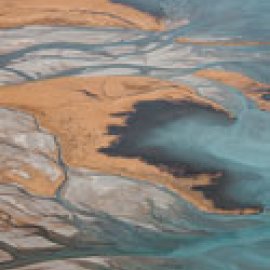Global Climate Events
-
English
-
ListenPause
Transcript
[Intro music]Welcome to World Ocean Radio…
I’m Peter Neill, Director of the World Ocean Observatory.
We have all borne witness to devastating weather and water events worldwide over the past few months. We have experienced massive rain storms, with record flood and erosion, roads uplifted and blocked by landslides like waterfalls, with high winds at the highest tides causing havoc in ports and working waterfronts, washing away beaches and coastal buildings, interrupting trade and traffic, harvest and healing, all dependent on our inter-relation with the ocean and waterways as productive, protected place for commerce and community.
It will take weeks, if not years, to restore structures and facilities, homes and businesses, that are predicated on access to the coast for residence, work, and recreation. There is paradox and such terrible irony here. This combination of natural and social circumstance should come as no surprise, the coincidence of extreme weather, ocean temperature, high tide, high wind and surge, predictable and inevitable and forewarned.
What was the preoccupation of scientists and environmentalists has now come home to us all. Now, as we face property loss, insurance or the lack thereof, re-construction material and labor costs, road and culvert replacement, and the additional loss by power outages and impassable roads and bridges, we face today and tomorrow- how it pains me to say it--the real price of our indifference and denial of yesterday.
We are not alone, even as our loss is so close and personal. People all over the world are experiencing comparable event and consequence. For years, this sadness has been foreseen, alarms sounded. And during that same interval, we have denied and postponed and defeated and unfunded the steps that might have been taken to preclude, or at least, prepare to meet the inevitable with adaptation, mitigation, and other inventive response to prevent the predictable, to protect us, not just from physical damage, but also psychological damage as real as the twisted piers, drowned buildings, and interrupted normality of our daily lives.
We will re-build. We will demonstrate resilience and determination and our communities will revive and take shape again. But will we respond with a plan that will protect our future work and living, and also address the deeper cause of the problem, the full challenge we must accept to solve it? That question is complicated and must be met with equally complicated response. We must admit to mistakes made and polices inadequate, to assumptions and attitudes that have not served us well. We must welcome new realities, take initiative, accept change, build a future that works, create a context for survival at all levels and in many forms.
If you witnessed any of this destruction directly, if you saw it on the news, you cannot ignore the dramatic volume of it all, the waves enveloping coastal houses, mountain-sides collapsing from erosion and run-off, highways destroyed and access to homes isolated, community services rendered useless. The problem will not be solved by political declaration and emergency funding. It is time to make the connection that this will be an ongoing phenomenon and we will have to response to a degree and by actions never taken before. We cannot perpetuate failed solutions. We must understand that we must sacrifice for change. We must understand that our old ways, indifferent to science and consequence elsewhere, cannot endure. Last year, I devoted 33 editions of World Ocean Radio to a series called RESCUE: How the Ocean Will Save Civilizations, where in I listed many different ways to respond through change across a full spectrum of behavior as a catalog of alternatives that we could explore and adopt to effect the change required.
Change does not just happen. It lives in the intersection of ambition and action, be it political, technological, social, or cultural. For every effect there is a cause, and, more often than not these days, there is evidence in the ambitious impetus of the human hand, as creator, benefactor, and eventually victim. Climate is ocean; ocean is climate; the sea connects all things. We must resort again to action, the application of a new ambition that will invent and embrace the cost, the sacrifice, of change, to meet the new condition of the natural world in which we live.
We will discuss these issues, and more, in future editions of World Ocean Radio.
[Outro music]
Devastating weather and water events abound worldwide. Rain, flooding, strong winds, extreme high tides, coastal erosion and inundation have caused havoc in ports and on waterfronts. These events are neither new nor are they going away any time soon. While we will continue to rebuild and revive, the time is now to plan a response as complicated as the issues we face, to admit to mistakes made, and to welcome new policies and initiatives that build a future that works, even in the face of increasingly unpredictable climate events.
About World Ocean Radio
World Ocean Radio is a weekly series of five-minute audio essays available for syndicated use at no cost by college and community radio stations worldwide. Peter Neill, Director of the World Ocean Observatory and host of World Ocean Radio, provides coverage of a broad spectrum of ocean issues from science and education to advocacy and exemplary projects.
- Login to post comments



